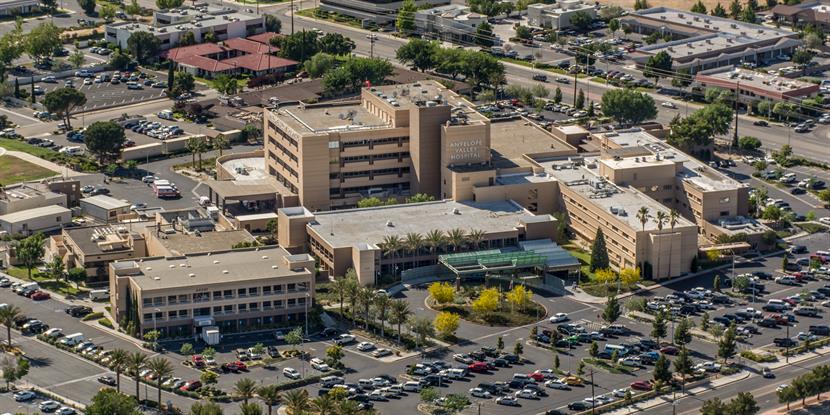Medical Imaging in Lancaster (Radiology)
Working to Ensure the Best Prognosis & Treatment Options
Antelope Valley Medical Center’s radiology unit is a full-service department providing a wide spectrum of diagnostic radiologic exams. Radiology provides coverage for outpatient and inpatient services, surgery, the emergency department, and trauma, providing onsite coverage 24 hours a day, 7 days a week. Imaging services provides care to patients in all age ranges, including neonate, infant, pediatric, adult, and geriatric.
Antelope Valley Medical Center’s Radiology Department is staffed by board-certified radiologists and certified technologists committed to providing clear diagnostic images and comprehensive reports. We strive for image accuracy and clarity to find and treat disease in its earliest and often most curable stages.
Radiology is comprised of the following services:
-
Diagnostic Radiology such an X-Ray, Interventional Radiology, Nuclear Medicine, MRI, Ultrasound, and CT scans
-
Outpatient treatment for gastrointestinal services interpreted by radiologists and other physicians in interventional and therapeutic procedures
Nuclear Medicine
The Nuclear Medicine Department is accredited by the American College of Radiology (ACR), and provides the full complement of diagnostic and therapeutic nuclear medicine procedures. Located in the Main Hospital radiology unit, we have two gamma cameras that enable us to perform all procedures necessary with the highest quality standards.
Magnetic Resonance Imaging (MRI)
The MRI performs a full range of magnetic resonance images. Our MRI unit is accredited by the American College of Radiology (ACR), which is a GE 1.5 Tesla Short Bore Magnet, enabled with AI technology, it operates with an advanced SIGNA™ Artist Lift 1.5T MR system. The department excels at non-invasive angiography; this low-risk procedure allows our radiologists and vascular surgeons to make critical patient care decisions without the inherent risks of invasive procedures such conventional angiography.
Ultrasound (US)
We provide excellent diagnostic quality images to our physicians with two state-of-the-art ultrasound machines. We also provide therapeutic treatment to our patients with procedures such as thoracentesis and paracentesis. Sonographers are onsite 24 hours a day, 7 days a week.
Computed Tomography Scan (CT)
The CT scan department provides service with three spiral GE 64 multi-slice scanners. This exciting technology allows us to perform fast scans in as little as one minute. We can also produce excellent quality angiographic images in far less time and less risk than conventional angiography. Having three scanners enables us to provide continuous coverage to our trauma services while not delaying service to our non-trauma patients, even while continuously increasing patient load. Our CT scanners are accredited by the American College of Radiology (ACR).
Interventional Angiography
We perform a full range of diagnostic and interventional peripheral angiographic procedures, including balloon angioplasty, intravascular stent placement, TIPPS, uterine artery embolization, and dialysis.
Gastrointestinal Endoscopy Center (GI Lab)
The Gastrointestinal Endoscopy Center, also known as the GI Lab is designated to provide a complete range of endoscopic and gastrointestinal services. GI Services provided are for all in-patients and outpatients. The department has advanced technology that is not found in many medical centers, technology such as Bravo and Double Balloon Endoscopy (DBE). All RNs in the department have California RN license, BLS, ACLS, and PALS certifications, and sedation/analgesia competency.
Bravo Esophageal pH Monitoring
Bravo esophageal pH monitoring is a minimally invasive test that evaluates whether acid from the stomach is refluxing into the esophagus and causing various symptoms. It requires the attachment of a small monitoring device onto the esophageal wall during an endoscopic procedure called upper endoscopy or EGD. While the patient is undergoing their usual daily activities for the next 2 days, the device measures the frequency and duration of acid refluxing up into the esophagus. The patient would record sleep, eating and symptoms in a diary. Most patients with acid reflux don’t need this test. But sometimes, ongoing symptoms despite treatment or atypical symptoms that may be caused by acid reflux will be best evaluated by this test.
Bravo is best used in diagnosing GERD. Gastroesophageal reflux disease (GERD) is defined as the backflow of stomach contents into the esophagus causing adverse symptoms and potentially resulting in esophageal damage. The most common symptom of GERD is heartburn. This is an uncomfortable burning sensation felt in the middle of the upper abdomen and/or lower chest.
Additional GI Services include:
- Screening and Diagnostic Colonoscopy
- Upper Endoscopy
- Small Bowel Enteroscopy
- Polypectomy
The Antelope Valley Medical Center Radiology Department may be reached at (661) 949-5705 for inpatient services.


